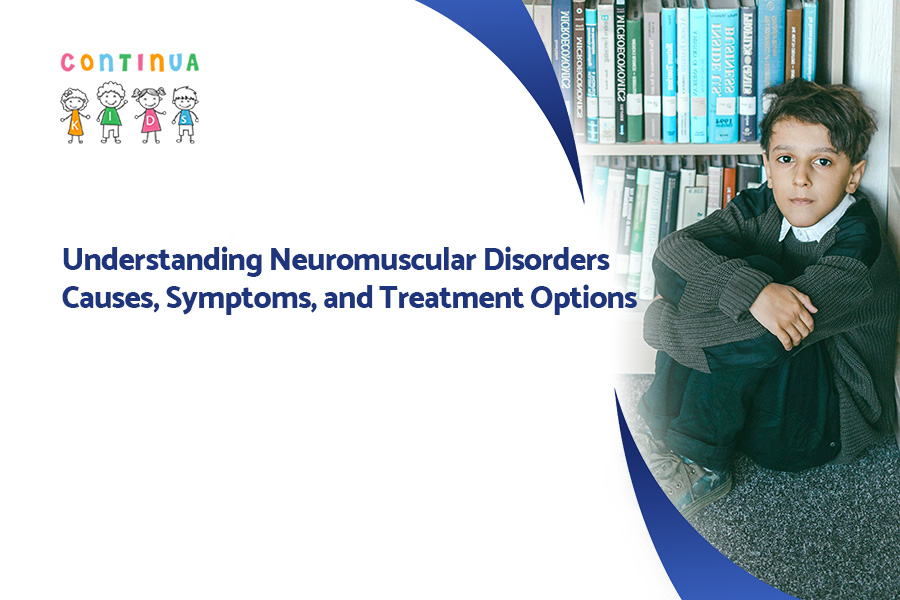
Understanding Neuromuscular Disorders: Causes, Symptoms, and Treatment Options
Hey Readers! Did you know? Body is a complex system where muscles and nerves operate to assist us in body coordination. But what happens when that communication breaks down? Neuromuscular diseases provide an answer to this question; these diseases define a group of conditions that only change the way in which muscles and nerves interact. These simple disorders can cause weakness, pain, or even disabled function.
This blog will give insights into the neuromuscular disorder and their causes and symptoms, and discuss various treatment modalities.
Let’s get started!
What Are Neuromuscular Disorders?
Neuromuscular disorders are diseases wherein the nerves have an adverse effect on the muscles, affecting their taking the necessary action involuntarily, and the more the nerves don’t help control muscle in a targeted manner, the more the muscles will become weak from lack of functional stimulation or hypertrophy sometimes. From infancy to ages of adulthood, different sets of diseases affect patients.
A list of common neuromuscular disorders is given as follows:
- Muscular Dystrophy (MD)
- Amyotrophic Lateral Sclerosis (ALS or Lou Gehrig’s Disease)
- Myasthenia Gravis (MG)
- Multiple Sclerosis (MS)
- Peripheral Neuropathy
- Guillain-Barré Syndrome (GBS)
- Spinal Muscular Atrophy (SMA)
Impact on Mental Health and Emotional Well-Being
| Emotional Impact | Examples | Coping Strategies |
|---|---|---|
| Depression & Anxiety | Fear of disease progression, social isolation | Therapy, mindfulness practices, medication |
| Loss of Independence | Difficulty with daily tasks or mobility | Adaptive equipment, home modifications |
| Frustration & Fatigue | Struggling with physical limitations or chronic pain | Support groups, energy conservation techniques |
Causes Neuromuscular Disorders
Genetic Mutations
Duchenne Muscular Dystrophy (DMD)
- Mutation in dystrophin gene
- Leads to muscle damage
Spinal Muscular Atrophy (SMA)
- Mutation in SMN1 gene
- Affects spinal nerve cells
Autoimmune Reactions
Myasthenia Gravis (MG)
- Immune attack on nerve receptors
- Causes muscle weakness
Guillain-Barré Syndrome (GBS)
- Immune system damaged peripheral nerves
- Leads to paralysis
Infections and Viruses
- Polio & Zika Virus
- Infect and impair nerves
- Cause muscle complications
Guillain-Barré Syndrome (GBS)
- Triggered by viral infection
- Immune response damages nerves
Toxins and Environmental Factors
- Heavy Metals & Chemicals
- Lead, mercury exposure damages nerves
- Can cause neuropathy
- Alcohol Abuse
- Prolonged use harms nerve function
- Leads to weakness and numbness
Age-Related Degeneration
- Natural Nerve Cell Decline
- Aging leads to nerve degradation
- Reduces muscle strength
Amyotrophic Lateral Sclerosis (ALS)
- Motor neurons deteriorate over time
- Results in progressive paralysis
What are the Symptoms of Neuromuscular Disorders?
- Muscle Weakness (especially arms, legs or face)
- Muscle Cramps or Spasms
- Twitching or Involuntary Movements
- Difficulty Walking and Climbing Steps
- Balance and Co-ordination Problems
- Fatigue or Muscle Fatigue
- Numbness, tingling or loss of sensation
- Difficulty Breathing or Swallowing
- Speech Difficulties
- Chronic Pain or Burning Sensations
- Loss of Reflexes
How Are Neuromuscular Disorders Identified?
Determining how to regulate the actions that create instances of nonfunctional behavior or also ways to build more occasions for assertiveness is exceedingly beneficial for a child in the short term. Every child deserves to love and to be appreciated.
As soon as you observe signs of developmental disability or nonfunctional behavior observable in your child, it is time to seek intervention. Through utmost patience and guidance, and a place such as the Continua Kids, most children will spring to the best version of themselves.
Treatment Options for Neuromuscular Disorders
Medications
- Steroids & Immunosuppressants (for autoimmune conditions)
- Anticonvulsants & Pain Relievers (for nerve pain)
- Muscle Relaxants (for spasticity and cramps)
- Anticholinesterase Drugs (like pyridostigmine for MG)
Physical and Occupational Therapy
- Strengthening exercises to maintain mobility
- Stretching to prevent muscle contractures
- Assistive devices (like braces, walkers, or wheelchairs)
Speech and Swallowing Therapy
Respiratory Support
- Non-invasive ventilation (like BiPAP)
- Cough-assist devices
- In severe cases, mechanical ventilation may be necessary
Lifestyle Modifications & Support
- Healthy diet and proper nutrition
- Stress management and mental health care
- Support groups and patient advocacy organizations
Conclusion
A diagnosis of neuromuscular disease can be overwhelming to receive, almost as if an ominous cloud has begun to hover over the head. It is terrible to think that a dark cloud is about to burst on the head. Yet under the worst circumstances, one can look forward to the meaning and joy life has to offer. The patients suffering from neuromuscular disease can look at medical intervention and therapy to mitigate the symptoms when supported by assurance meaning they will not be alone but taken care of.
Surely, patients have doctors, therapists, and neuromuscular organization experts to see to each case. Basically, they look forward to positively mentally revolutionizing the depressed senses afflicted by the disease, to constantly remind them and tell them about their real strength. Neuromuscular patients can be able to enjoy life despite all odds with a combination of hope, help, and self-commitment. Life even with its difficulties is quite beautiful.
